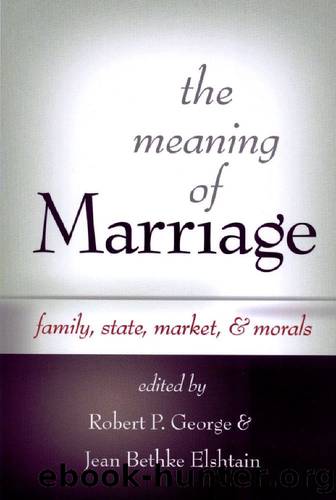The Meaning of Marriage: Family, State, Market, & Morals by

Language: eng
Format: mobi
Publisher: Scepter Publishers
Published: 2010-10-15T00:00:00+00:00
V. INSTRUMENTAL GOODS
Once marriage and marital intercourse are reduced to the status of instrumental goods, the intelligibility of marriage as providing a reason for people to enter it derives from its status as a means to other ends. What ends? Well, for contemporary liberals, the end of procreation, if that is what the spouses happen to want and, indeed, if they, for whatever subjective reasons, prefer sexual reproduction to other means now available or soon to be. But, if they would prefer not to have children, then contraception and, if need be, abortion can provide for that. Whether a particular marriage is a âreproductive alliance,â or an alliance for purposes entirely unrelated to reproduction, is purely a matter of the subjective preferences of the parties entering into the alliance. In no way is marriage considered to be naturally ordered to the coming to be and nurturing of children. Nor are the contours of the marital state, or the terms of the marital relationship, understood to be established or shaped by its childrearing function.
Marriage, on the liberal understanding, is marked by a plasticity or malleability that sharply distinguishes it from the traditional view. Marriage is also unnecessaryâeven for childrearing. If two (or perhaps more) people find, or suppose, that the state of being married works for them, then they have a reason to marry. An instrumental reason, you will note. If not, then marriage is not as a matter of principle understood to be a uniquely, or even especially, apt context for them to structure their lives together.
What about sex? What is the point of that in the liberal conception? What is sometimes referred to as lifestyle liberalism (to distinguish it from the old-fashioned political liberalism of say Franklin Roosevelt or Hubert Humphrey) rejects the view that sex is to be restricted to the marital relationship. It certainly has no ground of principle to object to sexual cohabitation outside of marriage. And even with regard to sex apart from stable relationships, lifestyle liberalism is ânonjudgmental.â Its main principle of rectitude in sexual matters is the principle of consent, not, as in the traditional view, the principle of marriage. So long as there is no coercion or deceit in the procurement of sex, sexual choices, as Frederick Elliston, for example, insists, do not raise moral questions. 67
Even adultery is unproblematic under the lifestyle liberal conception of marriage if, as in so-called open marriagesâa concept that makes sense only under a lifestyle liberal conceptionâthere is no deception of a spouse involved. Indeed, under the lifestyle liberal conception it is impossible to identify any reasonâthere are only subjective preferencesâfor spouses to demand fidelity of each other. Why should they âforsake all othersâ? What is the point? There is no reason, strictly speaking, not to have an âopen marriage,â only emotions that some people happen to have and others happen not to have.
As a matter of subjective preference, people can commit themselves to fidelity and enter into loving, long-term, monogamous relationships that mimic what, on the traditional understanding of marriage, they have strict moral reasons to do.
Download
This site does not store any files on its server. We only index and link to content provided by other sites. Please contact the content providers to delete copyright contents if any and email us, we'll remove relevant links or contents immediately.
| Codependency | Conflict Management |
| Dating | Divorce |
| Friendship | Interpersonal Relations |
| Love & Loss | Love & Romance |
| Marriage | Mate Seeking |
Doing It: Let's Talk About Sex... by Hannah Witton(8554)
The 5 Love Languages: The Secret to Love That Lasts by Gary Chapman(8517)
Should I Stay or Should I Go? by Ramani Durvasula(6792)
The Road Less Traveled by M. Scott Peck(6643)
The Lost Art of Listening by Michael P. Nichols(6478)
Daring Greatly by Brene Brown(5646)
We Need to Talk by Celeste Headlee(4876)
Beartown by Fredrik Backman(4425)
Men In Love by Nancy Friday(4335)
The State of Affairs by Esther Perel(3936)
The Rules Do Not Apply by Ariel Levy(3909)
How To Win Friends and Influence People by Dale Carnegie(3776)
Reflections Of A Man by Mr. Amari Soul(3705)
The Ethical Slut by Janet W. Hardy(3506)
Algedonic by r.h. Sin(3506)
Pillow Thoughts by Courtney Peppernell(3405)
Finding My Forever by Heidi McLaughlin(3309)
He's Just Not That Into You by Greg Behrendt & Liz Tuccillo(3306)
I Love You But I Don't Trust You by Mira Kirshenbaum(3231)
